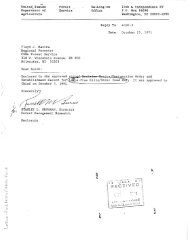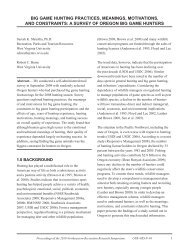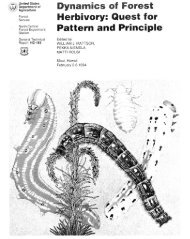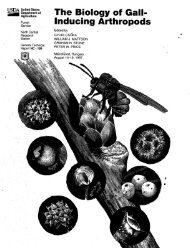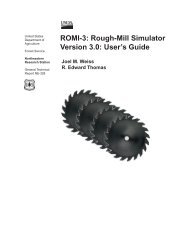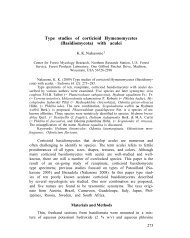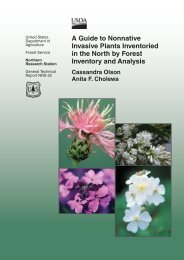Proceedings of the 2009 northeastern recreation research symposium
Proceedings of the 2009 northeastern recreation research symposium
Proceedings of the 2009 northeastern recreation research symposium
You also want an ePaper? Increase the reach of your titles
YUMPU automatically turns print PDFs into web optimized ePapers that Google loves.
EXPERIENCE USE HISTORY AND<br />
ITS RELATIONSHIP TO MANAGEMENT ACTIONS AND SATISFACTION<br />
Jordan W. Smith<br />
Department <strong>of</strong> Parks, Recreation, and Tourism<br />
Management<br />
North Carolina State University<br />
jwsmit12@ncsu.edu<br />
Roger L. Moore<br />
North Carolina State University<br />
Steven W. Burr<br />
Utah State University<br />
Abstract.—Th is paper analyzes <strong>the</strong> relationship between<br />
<strong>recreation</strong>ists’ patterns <strong>of</strong> prior experience and <strong>the</strong>ir<br />
preferences for and satisfaction with specifi c management<br />
actions. A mail-back survey was administered to a<br />
random sample <strong>of</strong> 1,500 <strong>of</strong>f -highway vehicle (OHV)<br />
owners in Utah, and data for this study come from<br />
<strong>the</strong> 600 owners who completed <strong>the</strong> questionnaire. Th e<br />
sample was segmented into four experience use history<br />
groups based upon respondents’ number <strong>of</strong> OHV trips<br />
during <strong>the</strong> past 12 months and <strong>the</strong> total number <strong>of</strong><br />
years <strong>the</strong>y had been riding OHVs. Th ese four groups’<br />
preferences for and satisfaction with fi ve specifi c<br />
management actions were <strong>the</strong>n compared. Results<br />
show that patterns <strong>of</strong> prior experience are related to <strong>the</strong><br />
importance placed upon three management actions:<br />
adequate provision <strong>of</strong> trailhead facilities, presence <strong>of</strong><br />
adequate signage, and presence <strong>of</strong> law enforcement.<br />
Th ere were no signifi cant diff erences among any <strong>of</strong> <strong>the</strong><br />
fi ve satisfaction measures.<br />
1.0 INTRODUCTION<br />
Over <strong>the</strong> past four decades, <strong>of</strong>f -highway vehicle (OHV)<br />
use has become one <strong>of</strong> <strong>the</strong> most rapidly growing outdoor<br />
<strong>recreation</strong> activities in <strong>the</strong> United States (Cordell et al.<br />
2005). Because <strong>of</strong> <strong>the</strong> large increase in participation,<br />
federal land managers and o<strong>the</strong>r <strong>recreation</strong> planners<br />
badly need information on how to meet <strong>recreation</strong>ists’<br />
demands while minimizing resource degradation and<br />
confl ict. Related <strong>recreation</strong> <strong>research</strong> would also benefi t<br />
from a foundational understanding <strong>of</strong> <strong>the</strong> unique nature<br />
<strong>of</strong> OHV use and its users. Th is paper begins to address<br />
<strong>the</strong>se needs by examining how OHV users’ preferences<br />
for and satisfaction with management actions relate to<br />
<strong>the</strong>ir prior experience with <strong>the</strong> activity.<br />
To a large extent, <strong>the</strong> provision <strong>of</strong> high quality <strong>recreation</strong><br />
experiences depends upon managers and planners being<br />
aware <strong>of</strong> how <strong>recreation</strong>ists diff er, what experiences<br />
<strong>the</strong>y seek, and how <strong>the</strong>y perceive <strong>the</strong>ir environment.<br />
Consequently, identifying within-activity diff erences<br />
has long been a goal <strong>of</strong> both <strong>recreation</strong> <strong>research</strong>ers and<br />
managers. Th e study <strong>of</strong> prior experience is one approach<br />
to identifying within-activity diff erences that is easily<br />
understood by managers and useful to <strong>research</strong>ers. Prior<br />
experience is a particularly useful analytical approach for<br />
<strong>recreation</strong> <strong>research</strong>ers because it is grounded in cognitive<br />
development <strong>the</strong>ory and represents a link between<br />
external behavior and <strong>the</strong> internal cognitive states that<br />
constitute attitudes, feelings, and motivations. Given<br />
prior experience’s dual benefi t to both managers and<br />
<strong>research</strong>ers, this study will employ it to explore withinactivity<br />
diff erences among OHV users. More specifi cally,<br />
prior experience will be used to understand diff erences<br />
in <strong>the</strong> importance placed upon specifi c management<br />
actions, as well as diff erent satisfaction levels with those<br />
actions.<br />
2.0 RELATED LITERATURE<br />
2.1 Experience Use History<br />
Prior experience is <strong>the</strong> sum <strong>of</strong> accumulated life<br />
experiences a <strong>recreation</strong>ist has within a particular activity<br />
(Virden 1992). Prior experience <strong>the</strong>oretically informs<br />
perceptions <strong>of</strong> <strong>recreation</strong> experiences; understanding<br />
individuals’ prior experiences is <strong>the</strong>refore important to<br />
understanding <strong>the</strong>ir motivations and attitudes. Prior<br />
experience is particularly useful for <strong>recreation</strong> <strong>research</strong><br />
because it represents similar cognitive structures created<br />
through <strong>recreation</strong>ists’ amount, type, and diversity <strong>of</strong><br />
participation (Schreyer et al. 1984).<br />
Prior experience ei<strong>the</strong>r at a particular site or with a<br />
particular activity has frequently been employed as a<br />
method for segmenting <strong>recreation</strong>ists. Typically, prior<br />
<strong>Proceedings</strong> <strong>of</strong> <strong>the</strong> <strong>2009</strong> Nor<strong>the</strong>astern Recreation Research Symposium GTR-NRS-P-66<br />
82





